HeadlinesJuly 28, 2014
Palestinian Toll Tops 1,000 as Truce Unearths Dozens of Buried Bodies
The U.N. Security Council has issued a presidential statement calling for an “immediate and unconditional humanitarian ceasefire” in Gaza as the Palestinian toll tops 1,000. The weekend saw a series of ceasefire announcements by both Israel and Hamas. On Saturday, more than 130 bodies were pulled from Gaza’s rubble during a 12-hour truce. Many displaced residents tried to return home only to find their neighborhoods reduced to rubble. One Gaza resident said the area of Beit Hanoun had been totally destroyed.
Ibrahim Abuodah: “The human beings are dead, the houses are damaged, the trees are dead, and the livestock is dead, as well. So they destroyed the land, the trees and everything. They totally destroyed it.”
Just before the truce took effect, an Israeli strike on a house in Khan Younis killed 20 people, including 12 members of the same family. After initially rejecting a ceasefire, Hamas on Sunday called for a 24-hour truce to mark the Muslim holiday ending Ramadan. Overall, the Palestinian death toll has now reached 1,031, mostly civilians, including at least 226 children. Israel says 43 of its soldiers have died, along with three civilians inside Israel. The United Nations says more than 180,000 Palestinians have been displaced and are now living in U.N. shelters. In the West Bank, nine Palestinians were also killed by Israeli soldiers and settlers over the weekend.
Kerry Denies Israeli Rejection of Ceasefire Offer
Secretary of State John Kerry has been intensively involved in an effort to reach a ceasefire. On Friday, the Israeli Cabinet rejected Kerry’s latest proposal, with Israeli sources calling it too skewed toward Hamas demands, including lifting the seven-year blockade of Gaza. The Israeli rejection was issued in private so as not to strain U.S. ties. But at a news conference, Kerry denied that Israel had rejected his ceasefire plan, claiming it was never formally proposed.
Secretary of State John Kerry: “There was no formal proposal or final proposal or proposal ready for a vote submitted to Israel. Let’s make that absolutely crystal clear. And Prime Minister Netenyahu called me a few minutes before this to make it clear that that is an error, inaccurate, and he’s putting out a statement to that effect. They may have rejected some language or proposal within a framework of some kind of suggestion at some point in time, but there was no formal proposal submitted from me on which there should have been a vote or which a vote was ripe.”
Hundreds in NYC, 3,000+ in Tel Aviv Protest Israeli Invasion of Gaza
Protests against the Israeli invasion of Gaza continue around the world. On Friday, hundreds rallied in New York City’s Times Square.
Protester 1: “Make sure that you’re sending a message to the U.S. government that you will not allow your taxpayer dollars to kill children in Gaza.”
Protester 2: “[Gazans] want us to know that Gaza is not a territory, it is not a prison, it is not a concentration camp. It is where resistance and liberation is born.”
On Saturday, some 3,000 people gathered for an antiwar demonstration in Tel Aviv, the largest such protest in Israel so far.
Spiking Violence in Libya Prompts U.S. Embassy Evacuation
Libya is facing its worst period of violence since the toppling of Muammar Gaddafi three years ago. More than 150 people have died in Tripoli and Benghazi during two weeks of fighting, including 50 over the weekend. The United States, the United Nations and Turkey have removed their diplomats, with the United States evacuating its embassy and moving officials to neighboring Tunisia.
Violence in Eastern Ukraine Keeps Investigators from Crash Site
Escalating violence in eastern Ukraine is hampering efforts to reach the crash site of downed Malaysian Airlines Flight 17. More residents fled to bomb shelters on Sunday as government forces clashed with rebel separatists in two major towns. At least eight civilians were killed. International monitors had reached a deal to visit the crash site in rebel-held territory, but the fighting has kept them away. Alexander Hug of the Organization for Security and Cooperation in Europe’s monitoring mission said the fighting has sowed confusion.
Alexander Hug: “The situation has rapidly changed, and that’s normal in this conflict. The front lines were not very clear. It was a very blurred picture.”
U.N.: Plane Downing Likely a War Crime; Over 1,100 Killed in Eastern Ukraine Since April
Ukraine has seen intensified violence in recent months as the U.S.-backed Kiev government steps up attacks on rebel-held areas. Earlier today, the United Nations’ top human rights official, Navi Pillay, said at least 1,129 people have been killed and more than 3,400 wounded since mid-April. Some 200,000 have also been displaced. A spokesperson for Pillay said the downing of Malaysian Airlines Flight 17 may amount to a war crime, and warned of increasing abuses in rebel-held areas.
Gianni Magazzeni: “The high commissioner has indicated this may amount to a war crime. … There has been a serious deterioration of the situation in the areas of the east controlled still by these armed groups. These include abductions, detentions, torture, executions, which are used to intimidate the population, which is often held as hostage or trapped in this pocket of territories in the Donetsk and Luhansk region.”
U.S. Accuses Russia of Cross-Border Fire; EU Approves New Sanctions
The Ukrainian and U.S. governments say the plane was shot down with Russian missiles supplied to the rebels, a claim Russia and the rebels have denied. The State Department has released satellite imagery it says proves Russia has fired into eastern Ukraine and moved heavy artillery across the border. State Department spokesperson Marie Harf said Russia is escalating military aid to the rebels.
Marie Harf: “We have new evidence that the Russians intend to deliver heavier and more powerful multiple-rocket launchers to the separatist forces in Ukraine and have evidence that Russia is firing artillery from within Russia to attack Ukrainian military positions.”
On Friday, the European Union joined the United States in imposing economic sanctions on Russia, as well as travel bans and assets freezes targeting Russian officials.
Obama Hosts Central American Leaders on Migrant Crisis
President Obama hosted Central American leaders at the White House on Friday to discuss the influx of migrant children on the U.S.-Mexico border. Obama met with the presidents of Guatemala, El Salvador and Honduras, the three home countries for the bulk of migrants fleeing violence and poverty. Obama said he warned that those children without valid claims will be deported.
President Obama: “We have to deter a continuing influx of children putting themselves at great risk, and families who are putting their children at great risk. And so I emphasize that within a legal framework and a humanitarian framework and proper due process, children who do not have proper claims, and families with children who do not have proper claims, at some point, will be subject to repatriation to their home countries.”
Honduran President Juan Orlando Hernández says he asked Obama for U.S. help in taking on the root causes of the migrant crisis, including the massive U.S. demand that fuels the Central American drug trade. President Obama has asked Republicans for $3.7 billion to address the migrant crisis, but Republicans have introduced a plan to allocate less than $1 billion. A group of immigrant rights advocates, meanwhile, has announced a picket line at the White House today “unless and until undocumented people are represented at the negotiating table.”
Argentina Faces Looming Deadline to Avoid Default; Protests Back Refusal to Pay Vultures
Argentina is facing a potential default on its sovereign debt if it fails to meet a Thursday deadline. A recent Supreme Court ruling sided with U.S. hedge funds who purchased Argentina’s debt for bargain prices after its financial crisis and then refused to cut the value of their holdings, as most other creditors did. A lower court judge then barred Argentina from repaying the majority of its creditors without also repaying the so-called “vulture funds,” led by billionaire Paul Singer’s NML Capital. The Argentine government says it is impossible to fully repay the vulture funds, risking the country’s second default in 13 years. At a protest in Buenos Aires, demonstrators backed the government’s refusal to pay the vulture funds.
Protester: “We don’t propose to go into default. We decided that it’s a sovereign decision not to pay. We’ve paid the IMF. We’ve paid the vulture funds. We’ve paid the International Centre for Settlement of Investment Disputes. We paid the Paris Club. And on top of this, they will declare a default. This is why we decided not to pay.”
Former Venezuelan General Avoids U.S. Extradition Following Aruba Arrest
A former Venezuelan general has avoided extradition to the United States. Hugo Carvajal was detained in Aruba last week at the request of the United States, which sought to try him on drug charges. But the Venezuelan government won Carvajal’s freedom after citing his diplomatic immunity. A U.S. indictment accused Carvajal of helping drug traffickers. The Venezuelan government says the warrant was politically motivated.
Most popular
- 1
- 2
- 3
- 4
Non-commercial news needs your support
Please do your part today.

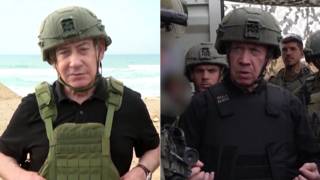
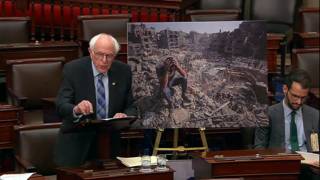
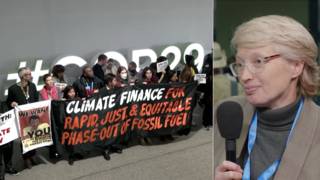
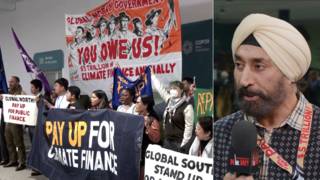





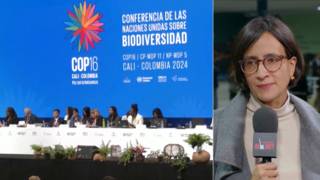
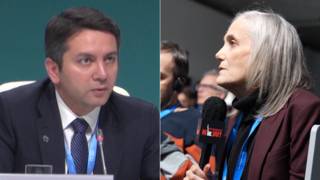

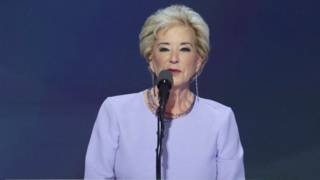
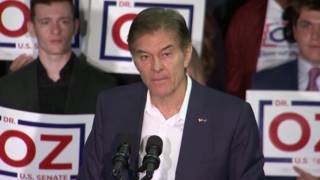
Media Options